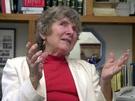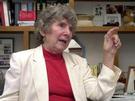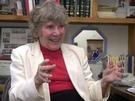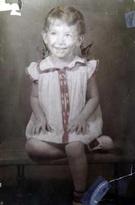
A Profile of Jane Moran
October 20, 2003 by Sandy Wells
'There's nothing I wanted to do that I didn't try"
The former actress works in a homey office on the second floor of a converted movie house in downtown Williamson. Her arthritic retriever, Lulu, snoozes beside the secretary’s desk.
In this laid-back, unpretentious setting, public-interest lawyer Jane Moran diligently works to protect children, poor people, mistreated workers and victims of domestic violence.
On Saturday, she will be in San Francisco accepting accolades from the Benchmark Institute, a nonprofit training organization for advocacy lawyers. A core teacher at Benchmark since 1986, she will reign as honored guest at the group’s “Celebration 2003” fund-raiser.
Her legal accomplishments keep mounting — prestigious committee appointments, chairmanships, cases before the West Virginia and U.S. supreme courts.
More intriguing are the fortuitous twists that brought her here, from Illinois to New York to California and, finally, to West Virginia in 1975.
Using perfect diction honed in childhood elocution lessons, she recounts how the death of Jack Kennedy imbued her with a sense of social responsibility that overpowered her passion for acting.
Her performing skills pay off in court, of course.
She’s 68.
“I’m an Irish Catholic girl from the cornfields of Illinois. When I was about 7 or 8, I decided I wanted to be an actress. The first time I performed, I was in the second grade. We’d put together a little play. The teacher had two little girls she liked, and we both wanted the lead, so she made us twins. We were to say everything at the same time.
“When I saw all those people out there, it terrified me. I forgot all my lines and just followed the other girl around. After that, I understood, and it was never a problem again.
“After a year of undergraduate school at the University of Iowa, my professor got me a summer stock job in Massachusetts. Within a week, I called my mother and said I was going to New York. I didn’t find out until I was 35 that acting was what my mother wanted to do more than anything. She was a teacher. My dad was a civil engineer. He died when I was a senior in high school. I don’t think he would have allowed it.
“For the next 12 years, I managed to earn my living as an actress, mostly on stage. This was a significant accomplishment, and I enjoyed every minute of it.
“But by the early 1960s, a lot was happening. I was very enamored of John Kennedy. When he was killed, it made me start to think about my responsibility to people around me.
“I decided I would take a year off and join VISTA. They sent me to the South Side of Chicago to teach me how to be a neighborhood organizer. Martin Luther King was just ascending, and his operation was there, so it was a very exciting place to learn.
“VISTA sent me to Springfield, Mass., where I was a neighborhood organizer in a public housing project. At the end of the year, I joined the regional VISTA staff and traveled.
“I wanted to go on with social and political work. If I ever went back to school, I wanted to go to UCLA. After three years with VISTA, I had no money, so I thought I would volunteer for Robert Kennedy’s campaign and check community colleges. Then, they killed Robert Kennedy. I was already moving in that direction, so I started going to Los Angeles City College. I went to school around the calendar until June 1975, when I graduated from Loyola Law School.
“When I was doing neighborhood organizing, I realized how much we needed a lawyer, what a valuable tool it was for poor people who are kind of disenfranchised.
“Doing things in front of people from the time I was a child makes it very comfortable for me in court. Acting is a study of what you do to make people, a jury, feel what you want them to feel — sad, happy, hurt, angry. Acting gives me an understanding of what I need to make happen to get that response.
“Most of all, acting is the only profession I know that teaches you how to concentrate. The whole essence of method acting is learning to focus on a goal to the exclusion of everything around you, and that is very effective in a courtroom.
“When I went back to school, I took as many community college credits as would transfer to UCLA. UCLA didn’t have a program that would allow me to work part time. I thought maybe I’d work for a year and go back. If I’d lost that momentum, I’m not sure I would have gotten back into it.
“But there’s always been a push from somewhere to do what I’ve done. The last day for registration, I got a letter from an Iowa insurance company saying my Uncle Billy had died and had named me the beneficiary on a policy. It was enough to pay my tuition and books for two years at UCLA.
“When I wanted to go to law school, I was a tenth of a point from Phi Beta Kappa and couldn’t get an interview. The bottom fell out of the space industry that year, and all the engineers in California were going to law school. At the last minute, I got a call from Loyola saying they had a night class opening, but they had to have my tuition. I had no money.
“Waiting in the mailbox was a letter from the same insurance company about a second insurance policy from my Uncle Billy. If there was any question that I was supposed to be a lawyer, I was absolutely sure when that second check showed up.
“When I graduated from Loyola, I hoped I never had to live in a big city again. I took trips through the Southwest visiting Indian reservations and rural legal services programs. I had an offer from an area down in Arizona that was 75 miles from the nearest movie theater. I decided I’d better give it some thought. They gave me a week.
“On the sixth day, I was going to take the job. But the postman came with a letter from a Jim Boomer. He’d just come from Phoenix to direct Mingo County Legal Services. My résumé had been passed into his hands, and he wanted me to call. I thought it was so fortuitous that this letter should arrive just minutes before I took the other job.
“I never looked back. I’ve been in Williamson since 1975, except when I went up to the law school to teach for two and a half years, and it’s the best decision I made in my entire life. This is where I’m supposed to be. It felt good from the first day I was here.
“Coming in as a federally funded lawyer, people don’t quite understand what you’re doing. In the late 1970s, we had the terrible flood. Everybody’s offices were wiped out. Because we were legal service officers, my partner Mike Kelly and I were the two lawyers available at the FEMA center. From that point, people began to accept us. Our strangeness went away. So when I came back from WVU to go into private practice, I had a place cut out for me.
“My first judge from the time I came to Williamson was Bob Staker, now a federal judge in semi-retirement. You couldn’t have anybody better for your first five years out of law school. He taught you how to be a lawyer.
“I was one of the first local women to practice in this court, and he made every effort to help me work myself into the Bar. At that time, a woman had to be twice as good as a man to be on an even playing field.
“When I was running the Appalachian Research and Defense Fund office, we couldn’t get into appointed cases, which would include criminal cases, abuse, neglect, juvenile delinquency. When I came back, my judge was Elliott Maynard, now a Supreme Court justice. He started appointing me to abuse and neglect cases. Then he designated me as the lawyer to represent children.
“That gave me an opportunity to go to the Supreme Court and change the law, and the Supreme Court got to know me and associated me with this. It also meant I was being paid by the public defender’s office. That was the financial support I needed to do all the free stuff I do for the government.
“The wonderful thing about my life is, there’s nothing I wanted to do that I didn’t try. I may not have succeeded, but at least I don’t have anything hanging there that I think, oh, I wish I’d tried that.
“I have absolutely no regrets about not marrying. I might regret not having a child, but I have so many children whose lives I’ve affected. Maybe that’s what was supposed to happen. Those were my children.”
To contact staff writer Sandy Wells, call 348-5173 or e-mail sandyw@wvgazette.com.
![]()
![]()
| Photos |
 This familiar face at the Mingo County Court-house belongs to actress-turned-lawyer Jane Moran, a public-interest lawyer widely known for her work on behalf of abused and neglected children. Author of the original Family Protection Act, she serves on a state Supreme Court committee that oversees juvenile justice procedures.  “I started to think about my responsibility. They emphasize in a Catholic education that we have a responsibility for and to the people around us.”  “I was one of the first local women to practice in this court. A woman had to be twice as good as a man to be on a level playing field.”  “Coming from a big city, one of the things about a small town you have to adjust to is that you live in a fishbowl. Everyone is aware of everything you do.”  As a little girl in Illinois, Jane Moran knew she wanted to be an actress when she grew up. |